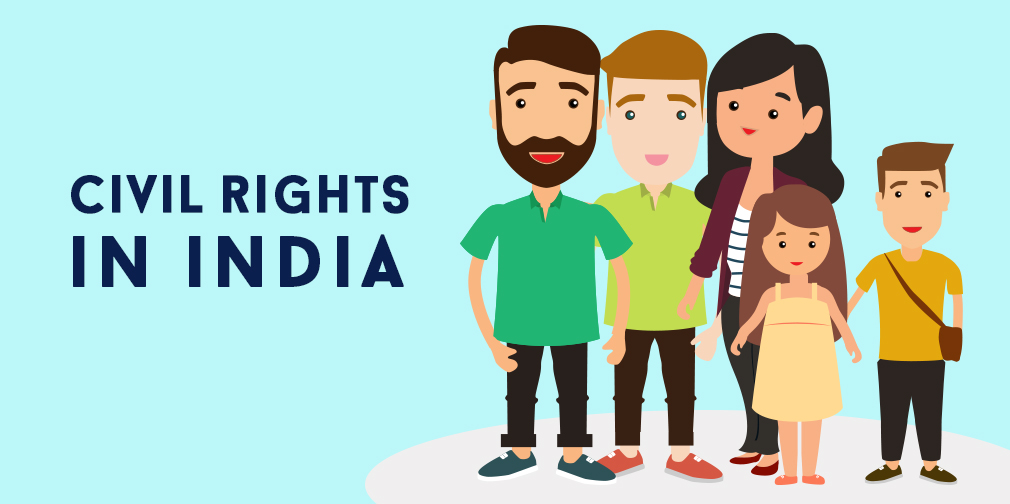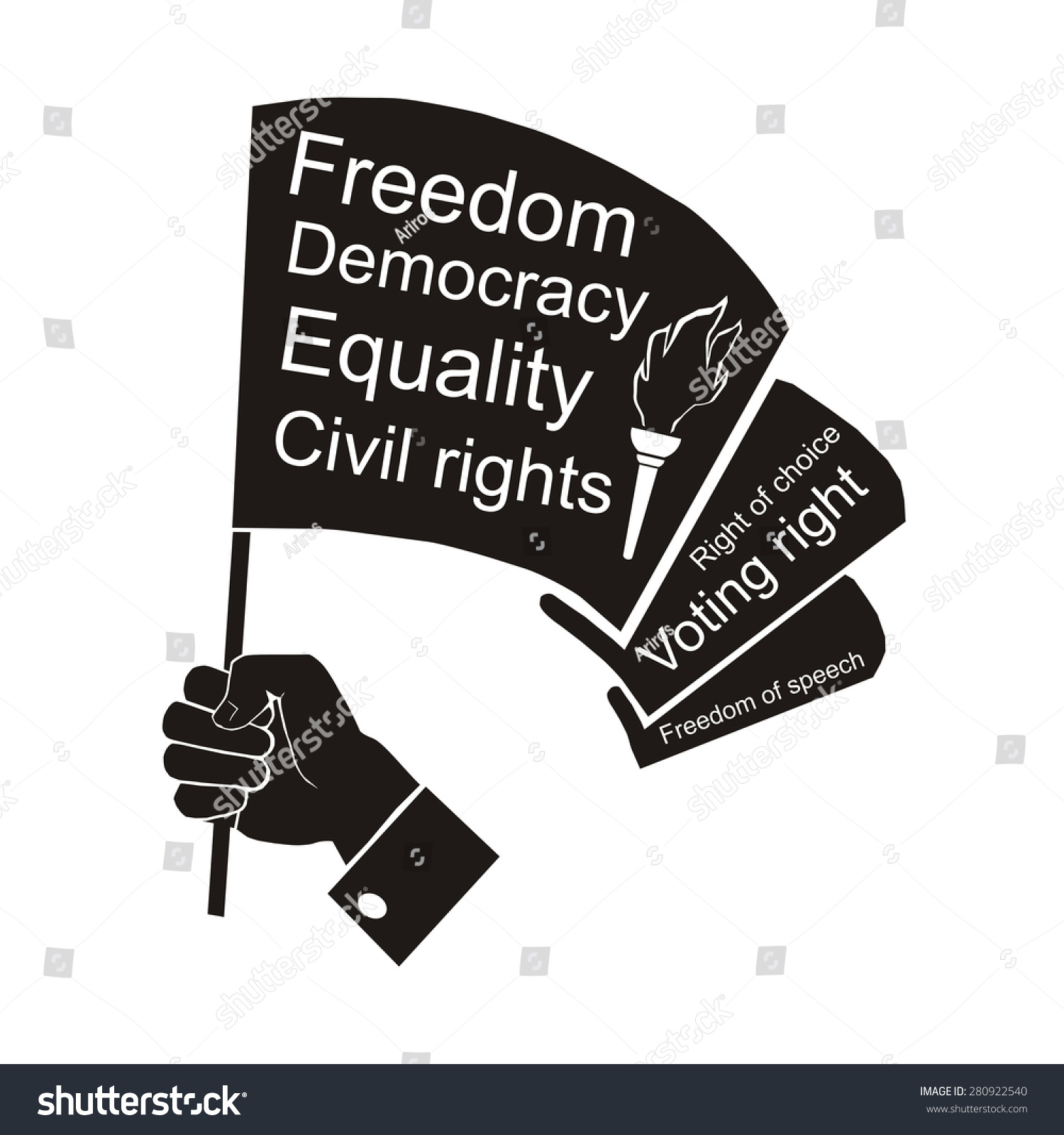Civil Rights & Racial Discrimination – Definition, History, Laws ,Acts and Movement .
Introduction
India, the largest democracy in the world, has witnessed a lot of discrimination and harassment. Many people are not allowed to convert their religion without getting approval from their parents. The Indian constitution prohibits discrimination on the basis of caste, sex and creed, but it is still prevalent in our society.
What is Civil Rights ?
Civil rights define the rights of humans to achieve equal treatment (and to be unfastened from unfair treatment or "discrimination") in a number of settings — collectively with education, employment, housing, and more — and are blanketed with the resource of the usage of numerous country and federal laws, mainly the Civil Rights Act of 1964.
Civil rights moreover make certain that people are not discriminated in competition to at the concept of race, sex, religion, or national origin. If your civil rights have been violated, you may have grounds for a civil case in competition to the man or woman or business enterprise that committed the violation.
Civil Rights Act 1866
This act was passed after the Civil War to ensure that freed slaves were citizens .It was passed by congress on April 9, 1866 and was signed into law by president Andrew Johnson. The law gave citizenship and civil rights to all people born in the United States who are not white, with the exception of Native Americans, who would be granted citizenship later, in 1924.
The 14th amendment was ratified on July 9, 1868 and it incorporated most of the provisions of the Civil Rights Act into the Constitution. Both laws are considered iconic achievements of the Reconstruction era.
Civil Rights Act 1964
The Civil Rights Act of 1964 is primarily based totally on race, color, religion, sex, or countrywide origin. It prohibits unequal software of voter registration requirements, racial segregation in colleges and public accommodations, and employment discrimination through employers and hard work unions.
While civil rights payments were delivered for years in Congress to cope with a extensive variety of issues — together with lynching, vote casting rights, truthful housing and employment — none had been capable of byskip each chambers of Congress till 1964. President Lyndon B. Johnson pressed for passage of the invoice following Kennedy's murder; he additionally met with civil rights leaders on the White House to talk about rules.[2] The invoice handed seven months later; it turned into considered "the maximum sweeping civil rights rules on the grounds that Reconstruction."
The Civil Rights Act of 1964 prohibited discrimination in opposition to African Americans and ladies in hiring through requiring employers to offer same employment possibility with out regard to race or gender.
Civil Rights Act 1968
The Civil Rights Act of 1964 helped bring an end to racial discrimination in public places and made it illegal for employers to discriminate against someone based on race, color, religion, sex or national origin.
Although the act was a huge victory for civil rights activists, it only applied to public life and did not include discrimination in housing. A year later, the Voting Rights Act was passed to make sure all citizens were able to vote regardless of race.
Martin Luther King Jr. and other leaders continued to fight for equality throughout the country. In April 1968, King was assassinated by James Earl Ray in Memphis, Tennessee. After his death, riots broke out in cities across the country as people protested racial discrimination and demanded more change. One month after King's assassination, Congress passed another important law: the Fair Housing Act of 1968 (also known as Title VIII of the Civil Rights Act of 1968).
History of Civil Rights Movement In America
The civil rights movement have become a war for justice and equality for African Americans that passed off especially withinside the Nineteen Fifties and 1960s . .. In many situations they took the form of campaigns of civil resistance aimed closer to attaining extrade with the resource of the usage of nonviolent methods. In some situations they were accompanied, or followed, with the resource of the usage of civil unrest and armed rebellion.
History of Civil Rights Movement In India
The evolution of civil rights in India can be traced back to the first half of the 20th century. During this period, Mahatma Gandhi, known for his non-violent freedom struggle, played a significant role in shaping the future of civil rights movement in India.
The Civil Disobedience Movement (1930-34), launched by Mahatma Gandhi and the Indian National Congress was one of the major milestones achieved during this period. The purpose of this movement was to resist the British rule by refusing to obey certain laws enacted by them.
By the end of 1930s, several members of the Dalit community had started demanding their civil rights in order to attain social equality. However, they failed to achieve their goal because the upper caste Hindus did not support them.
In 1943, a conference on Dalit rights was organized by B.R. Ambedkar at Bombay (currently Mumbai). This conference is considered as an important event in the history of civil rights movement in India as it gave birth to a new autonomous organization named as Scheduled Castes Federation (SCF). This organization eventually succeeded in paving way for future campaigns on civil liberties.
What is Racial Discrimination ?
Racial discrimination is any movement that treats someone unfavorably due to their race, color, ancestry, countrywide origin, or ethnicity.
Racial discrimination takes place whilst human beings are handled in a different way primarily based totally on their pores and skin color. Racial discrimination is a criminal offense on the subject of hiring, firing, selling or shedding workers. It additionally applies to recruiting, checking out and task assignments. Racial discrimination additionally applies to harassment withinside the administrative center and retaliation towards a person who complained approximately racial discrimination.
Examples of Racial Discrimination:-
The following are some examples of racial discrimination:
Aboriginal and Torres Strait Islander people applying for a job who are not considered because they are Aboriginal or Torres Strait Islander.
Aboriginal and Torres Strait Islander people being given lower wages than other workers because they are Aboriginal or Torres Strait Islander.
A landlord not renting to Aboriginal and Torres Strait Islander people because they are Aboriginal or Torres Strait Islander.
An employee who is bullied by workmates because of their race, colour, descent, national or ethnic origin or immigrant status.
Meaning of Racism
Racism is the notion that each one individuals of every race own traits or skills particular to that race, mainly in an effort to distinguish it as inferior or advanced to some other race or races. It may suggest prejudice, discrimination, or antagonism directed towards different human beings due to the fact they're of a special race or ethnicity.
Modern variations of racism are frequently primarily based totally in social perceptions of organic variations among peoples. These perspectives can take the shape of social actions, practices or beliefs, or political structures wherein special races are ranked as inherently advanced or not as good as every different, primarily based totally on presumed shared inheritable traits, skills, or qualities.
Systematic racism can be institutionalized via the practices and structures of social systems and establishments inclusive of authorities coverage and regulation enforcement. Racism can arise for my part and unconsciously, via implicit biased attitudes and stereotypes, in addition to systematically via express racial legal guidelines and policies.
Racial Discrimination Act
The Equal Remuneration Act, of 1976 provides for the wages or salaries of equal remuneration to both men and women workers and for the prevention of discrimination, on the basis of sex, against females in the matter of employment.The Act seeks to provide for the payment of equal remuneration to men and women labours for same type of work or work of a related nature and for the prevention of discrimination, on the ground of sex, against female in matters relating to employment.
The PWD Act 1995 is a legislation enacted by Government of India for people with disability (PWD). It has been enacted as per Agenda 21 adopted at United Nations Conference on Environment and Development (UNCED) in 1992 at Rio de Janeiro, Brazil. It ensures that people with disabilities enjoy their rights equally as other citizens.
The Persons with Disabilities (Equal Opportunities, Protection Of Rights And Full Participation) Act was enacted in 1995 which states that no disabled person will be discriminated against.
Laws againts Racial Discrimination
Laws against racial discrimination have been passed in India, including a law that bans acts of discrimination based on race. Section 153A of the Indian Penal Code (IPC) punishes anyone who makes statements that promote enmity among distinctive groups on grounds of religion, race, region of birth, residence, language and so on.
The Prevention of Insults to National Honour Act 1971 prohibits insults to the national flag or the Constitution. The Scheduled Castes and Tribes (Prevention of Atrocities) Act 1989 specifically protects Dalits from discrimination.[9] Under Article 16(4) of the Constitution, special provisions may be made by law for the socially and educationally backward classes with respect to their admission to educational institutions maintained by the State or receiving State aid, and for the Scheduled Castes and Tribes with respect to their admission to such institutions. In 2018, India passed an anti-discrimination law which criminalizes stringent behavior towards certain communities.
History of Racial Discrimination
The first and foremost reason is that India is a country of diverse culture and religions. The Indian population is divided into different castes and sub-castes, each having its own set of beliefs. The caste system has given rise to a number of issues in India. The most common issue being racism.
In India, racism is not restricted to any one skin color or caste but includes the entire population. It doesn’t matter whether you are white, black or brown, you will be discriminated against because of your race.
There are around 700 million Dalits in India, or roughly 30 percent of the country's population.Dalits have faced exclusion and discrimination for centuries, but the practice was outlawed after India gained independence from Great Britain in 1947. However, the caste system has remained firmly entrenched in Indian society with many Dalits still facing social exclusion and discrimination in the workplace.
Many are forced to live in segregated areas where they are denied basic services such as electricity, water and education. Some lower caste communities resort to manual scavenging, one of the most degrading occupations within India's rigid caste hierarchy.
The lowest ranked Dalits have traditionally been treated as untouchables and were made to perform the most menial tasks such as removing dead animals or cleaning human waste without any means of protection.
Conclusion
There are great many problems in India by racial discrimination and discrimination of sex. It is very necessary to reduce the levels of such kinds of activities, besides this it is also important to enlighten the masses about their rights we need to develop our country as a strong nation not by a military ways but by creating awareness about the rights people deserve.






Comments
Post a Comment
If you want to ask something, then let me know.